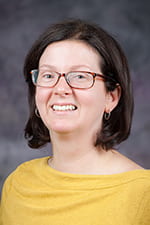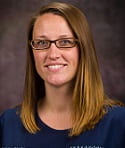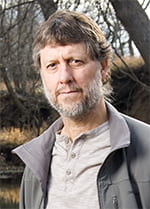Below you will find a list of Kansas State University faculty members who volunteered to host a KS-LSAMP student in their research lab during Summer 2019. We appreciate their willingness to participate in our program! THANK YOU!!
 Professor James H. Edgar
Professor James H. Edgar
Chemical Engineering
Dr. Edgar’s research is focused on the applications of chemical engineering principles to improve semiconductor processing. Specific areas of interest include crystal growth, epitaxy, and characterization of wide band gap semiconductors including group III nitrides (aluminum nitride and gallium nitride), silicon carbide, and boron compound semiconductors (boron phosphide and icosahedral boron arsenide).
You can learn more about Dr. Edgar here https://www.che.ksu.edu/people/faculty/edgar/
Dr. Kirk’s research focuses on subsurface biogeochemistry related to energy and water quality questions. Current studies in his laboratory include efforts to better understand how variation in carbon dioxide levels affect microbial activity in the subsurface, controls on arsenic mobility in freshwater aquifers and factors that influence biogenic natural gas formation in unconventional natural gas reservoirs.
You can learn more about Dr. Kirk and his research lab here:
http://www.k-state.edu/geology/faculty-staff/Kirk.html
http://matthewkirk.weebly.com/index.html
 Dr. Melanie Derby
Dr. Melanie Derby
Mechanical Engineering
Dr. Derby’s research focuses on technical problems in the thermal fluid sciences which have unanswered fundamental problems and applications to industry. Her areas of expertise include multi-phase flows, phase change, and building energy.
You can read more about Dr. Derby here: http://www.mne.k-state.edu/people/faculty/derby/
Dr. Jocelyn McDonald
Biology
The McDonald lab studies the underlying mechanisms–the genes and proteins–that control migration of a small group of cells in Drosophila called the “border cells”. Border cells migrate during development of the ovary and are an excellent and simpler model to understand how cells move during human embryonic development and in tumor invasion.
You can read more about Dr. McDonald’s lab here: http://www.k-state.edu/biology/people/tenure/mcdonald/
 Dr. Suprem R. Das
Dr. Suprem R. Das
Industrial and Manufacturing Systems Engineering
Dr. Das’ most recent research interests involve additive manufacturing of graphene, nanotubes and inorganic nanowires for sensing and energy applications such as electrochemical sensing and thermoelectric energy generation. He is interested in studying transport physics in micro/nano-manufactured devices such as transistors with low dimensional channel materials and applying them to various platforms.
You can read more about Dr. Suprem R. Das here https://www.imse.ksu.edu/people/faculty/das/
Dr. Bailey’s research focuses on memory systems and how they change with age and related to individual differences and age-related differences in working memory. The first line involves evaluating the efficacy of different strategies that people use to help improve their memory. The second line of work involves how individuals effectively segment, or chunk, incoming information and how they update their working memory representations accordingly. Finally, the third line of work involves how older adults use their existing knowledge to help them remember information about everyday activities.
You can read more about Dr. Bailey here https://www.k-state.edu/psych/research/baileyheather.html
 Dr. Trisha Moore
Dr. Trisha Moore
Biological and Agricultural Engineering
Dr. Moore’s research is focused on understanding the processes by which natural-based engineered systems contribute to the production of ecosystem services (defined as the benefits people obtain from ecosystems). Her research group applies models and empirical data to explore questions regarding potential tradeoffs and synergies in the spatial and temporal delivery of ecosystem services under various watershed management approaches.
You can read more about Dr. Moore here https://www.bae.ksu.edu/people/faculty/moore/
Dr. Dodds’s research central area of emphasis has been trophic state of rivers and streams as influenced by biotic and abiotic factors. Recent efforts have also been directed toward providing a scientific basis for establishment of nutrient criteria in streams, valuation of aquatic ecosystem services, scaling predictions of ecological measurements, broad geographic patterns in aquatic habitats, and prairie stream ecology. His areas of expertise include water quality, nutrient cycling, nutrient criteria, value of water, nitrogen cycling.
You can read more about Dr. Dodds here https://www.k-state.edu/biology/people/tenure/dodds/
Dr. Platt’s research focuses on developing and empirically testing general theory aimed at uncovering what shapes the evolution of virulence and cooperation. Much of our work focuses on pathogens that actively grow and interact both within hosts and environmental reservoirs such as soil and water systems. His areas of expertise include bacterial genetics, evolution of microbial interactions, cooperation, and virulence
You can read more about Dr. Thomas Platt here https://www.k-state.edu/biology/people/tenure/platt/
 Dr. Landon Marston
Dr. Landon Marston
Civil Engineering
Dr. Marston’s research explores the interdependencies among food, water, energy and trade in order to establish tradeoffs, assess risk, and inform sustainable policy and management of these resources. More generally, he is interested in how society and water resources co-evolve across different scales in a coupled human-nature system. His research is inherently interdisciplinary, drawing from hydrology, water resources engineering and economics.
You can read more about Dr. Marston here https://www.ce.ksu.edu/people/faculty/marston/
 Dr. David E. Thompson
Dr. David E. Thompson
Electrical and Computer Engineering
Dr. Thompson’s research lies at the intersection of electrical and biomedical engineering. Most of his work is measuring neural signals (usually scalp electro-encephalogram or EEG), trying to guess a user’s communicative intent or emotional state. These technologies hold the promise to restore communication to the most severely paralyzed people, as well as add to the body of knowledge about everyone’s decision making processes.
You can read more about Dr. Thompson here https://www.ece.k-state.edu/people/faculty/thompson/
 Dr. William Hsu
Dr. William Hsu
Computer Science
The Knowledge Discovery in Databases lab group has a research emphasis in the areas of applied artificial intelligence (AI) and knowledge-based software engineering (KBSE) for decision support systems. The group looks for ways to systematically decompose analytical learning problems based upon information theoretic and probabilistic criteria, so that the most appropriate machine learning methods may be applied to the resulting transformed problems. More specifically, the group is interested in machine learning, data mining and knowledge discovery from large spatial and temporal databases, human-computer intelligent interaction (HCII) and high-performance computation in learning and optimization.
You can learn more about Dr. Hsu and the Knowledge Discovery in Databases lab here: http://people.cis.ksu.edu/~bhsu/




